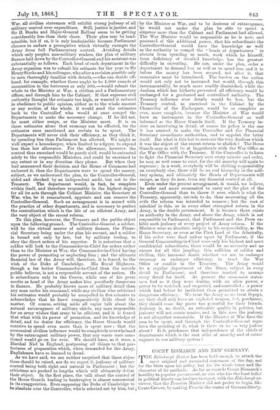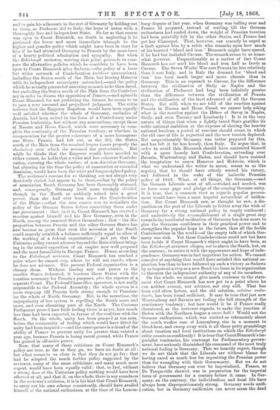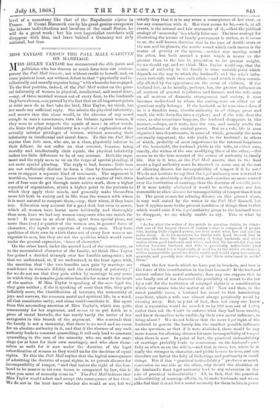COUNT BISMARCK AND NEW GERMANY.
to them, as Piedmont did to Italy, the hope of union with a thoroughly free and independent State. So far as that course was open to Count Bismarck, no doubt in neglecting it he preferred the lower and more immediate triumph to the higher and grander policy which might have been in store for him if he had attracted Germany to Prussia by the mere force of a hearty political admiration and sympathy. But when the Edinburgh reviewer, waiving that point, proceeds to com- pare the alternative policies which he considers to have been open to Count Bismarck after Sadoa-a,—the policy of a loose but wider network of Confederation (Without annexations), including the States south of the Main, but leaving Hanover with its independent sovereignty untouched,—and the policy which he actually pursued of annexing as much as he then dared, but excluding the States south of the Main from the Confeder- acy in order to disarm the opposition of France,—and upbraids Count Bismarck for not preferring the former, he seems to us to pass a very unsound and prejudiced judgment. The critic believes that the Emperor Napoleon would have been equally well satisfied whether the whole of Germany, exclusive of Austria, had been united in the form of a Confederacy under Prussian leadership, but without any annexations, except those of Nassau and Hesse Cassel, which were necessary to com- plete the continuity of the Prussian territory, or whether, in compensation for the greater coherence of a more homogene- ous State, Prussia had left out, as she did, the States south of the Main from the nominal league (more properly the do»dnion) over which she assumed the protectorate. But while he thinks that the Emperor would have acceded to either course, he holds that a wider and less coherent Confede- ration, covering the whole surface of non-Austrian Germany, but abjuring for the time the policy of annexation or extended dominion, would have been the wiser and longer-sighted policy.
The reviewer's reasons for so thinking are not always very decisively stated, but appear to be these,—that by the policy of annexation South Germany has been thoroughly alarmed, and, consequently, Germany itself more strongly divided, though in the North so suddenly raised into a great power, than she had ever been since the Confederation of the Rhine ;—that the true course was to assimilate the policy of the German States before connecting them under one government ; that, as it is, Count Bismarck has created a reaction against himself and his New Germany, even in the North, among the annexed States themselves ; that "the dis- proportion between Prussia and the other German States has now become so great that even the accession of the South could scarcely establish a balance sufficiently equal to allow of the working of a federal organization ;" and yet that the Unitarian policy cannot advance beyond the Main without bring- ing in the armed opposition of an empire now well prepared and the most formidable in Europe, France. Hence, according to the Edinburgh reviewer, Count Bismarck has reached a point where he cannot stop, where he will not recede, where he dare not advance. The present Federal organization is a clumsy sham. Without leaving any real power to the smaller States federated, it burdens those States with the taxation necessary for Prussia's purposes, plus the expense of a separate Court. The Federal Chancellor, moreover, is not really responsible to the Federal Assembly ; the whole system is a mere stop-gap till Prussia feels strong enough to Prussian- ize the whole of North Germany. But, in the meantime, the unpopularity of her system is repelling the South more and more, and even alienating part of the North. The Customs Parliament proved how little feeling there is as yet, how much less than had been expected, in favour of the coalition with the South. On the whole, unity has been grasped at too soon, before the community of feeling which would have fitted for unity had been inspired ;—and the consequence is a dread of the ability of France to prevent unity far greater than existed a year ago, because Prussia is losing moral ground, while France has gained in offensive power.
Now, that many of these criticisms on Count Bismarck's policy are true, as far as they go, we have no doubt at all ; but what seems to us clear is that they do not go far ; that had he adopted the much feebler policy suggested by the reviewer, many of the same criticisms, and many much more cogent, would have been equally valid ; that, in fact, without a strong dose of the Unitarian policy nothing would have been effected at all, and that if, on the whole, there is any soundness in the reviewer's criticism, it is in his hint that Count Bismarck, to carry out his own scheme consistently, should have availed himself of the national enthusiasm at the time of the Luxem- and to gain his adherents in the rest of Germany by holding out burg dispute of last year, when Germany was boiling over and France ill prepared, instead of waiting till the German enthusiasm had cooled down, the weight of Prussian taxation had been painfully felt in the other States, and France had got her Chassepot. That, however, can scarcely be urged as a fault against him by a critic who remarks upon how much of his boasted "blood and iron" Bismarck might have spared, if he had but imitated Cavour. The remark seems to us some- what perverse. Unquestionably as a matter of fact Count Bismarck has not used his blood and iron half as freely as Cavour. The Seven Weeks' War cost Prussia far less relatively than it cost Italy, and in Italy the demand for blood and iron' has been much larger and more chronic than in Germany. This is no reproach to Cavour, for the difference between the civilization of Sicily or Naples and the civilization of Piedmont had long been infinitely greater than the difference between the civilization of Prussia and the civilization of the least advanced of all the German States. But still, when we are told of the reaction against Prussia in Nassau and Hesse Cassel, we cannot help asking what is the reaction against the Hduse of Savoy in Naples, Sicily, and even Tuscany and Lombardy ? It is in the very nature of things that when a lightly taxed State gratifies its noble national ambition at the expense of sharing the heavier national burdens, a period of reaction should come, in which the old ease of life is regretted and the new tension deplored. But unquestionably Germany was better prepared for this, and has felt it far less keenly, than Italy. To argue that, in order to avoid this, Bismarck should have contented himself with a mere loosely knit Confederation, extending over Bavaria, Wurtemburg, and Baden, and should have resisted the temptation to annex Hanover and Holstein, which is what we understand the writer to mean, seems to us like arguing that he should have utterly wasted his victory, and followed in the wake of the imbecile Prussian policy of 1848. What, of all things, the Germans,—and the German Liberals most of all,—wished and needed, was to have some gage and pledge of the coming German unity. It is true, that a common view as regards popular govern- ment would have been a most hopeful antecedent of unifica- tion. But Count Bismarck saw, or thought he saw, a dis- position on the part of the Liberals to fritter away the wish of Germany for a strong national policy in empty sentiment ; and undoubtedly the accomplishment of a single great step towards the territorial unification of Germany has done more to give the Germans confidence in their practical power and to strengthen the popular hope in the future, than all the feeble Confederations in the world—of the empty talk of which Ger- many was sick. Yet these Confederations could not but have been feeble if Count Bismarck's object ought to have been, as the Edinburgh reviewer alleges, not to alarm the South, but, on the contrary, to entice it with the appearance and hope of inde- pendence. Germany was in fact impatient for action. We cannot conceive of anything that would have satisfied this national as- piration less than to have followed up such a victory as Sadowa by so impotent a step as a new Bund too loose in its organization to threaten the independent authority of any of its members.
On the whole, we cannot give much credence to the state- ment that Count Bismarck has now got to a point where he can neither retreat, nor advance, nor stop still. That has been said often before, and the old solution, solvitur ambit- lando, has been found sufficient. It may be true that just now Wurtemburg and Bavaria are feeling the full strength of the reactionary tendency ; but how would it be if France really threatened, as the reviewer expects, to make the junction of Baden with the Northern league a casus belli ? Would not the German enthusiasm, which was excited so vehemently about the much weaker case of Luxemburg, rise in a moment to blood-heat, and sweep away with it all those petty grumblings about taxation and local institutions on which the Edinburgh critic counts so confidently? It is true that Count Bismarck's im- perialist tendencies, his contempt for Parliamentary govern- ment, have seriously diminished his command of the most truly national feeling in Germany. This we heartily regret, though we do not think that the Liberals are without blame for having cared so much less for organizing the Prussian power than for wrangling with their Government. But we do not believe that Germany can ever be imperialized. France, as De Toequeville showed, was in preparation for the imperial form of government for a century before it came. In Ger- many, on the contrary, the individualism and local life have always been disproportionately strong. Germany needs unifi- cation, but in Germany unification can never mean the dead level of a monotony like that of the Napoleonic regime in France. If Count Bismarck can by his great genius overpower the intense individualism and localism of the small States, he will do a great work ; but his own imperialist crotchets will disappear with him, and leave behind a Germany not only national, but free.
































 Previous page
Previous page